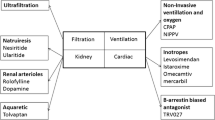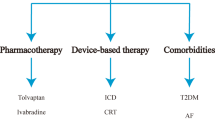Abstract
Digoxin remains one of the oldest therapies for heart failure; however, its safety and efficacy have been controversial since its initial use. Questions that remain include the clinical efficacy of digoxin when added to contemporary medical therapy, when and if it should be added, and how to minimize adverse effects. In this review, we will summarize recent data on the use of digoxin in systolic heart failure and address some of the controversies regarding the role of digoxin in the modern era of heart failure treatment.



Similar content being viewed by others
References
W W. An account of the foxglove, and some of its medical uses: with practical remarks on dropsy, and other diseases. Birmingham, England: M Swinney 1785.
Digitalis Investigation G. The effect of digoxin on mortality and morbidity in patients with heart failure. N Engl J Med. 1997;336:525–33.
Smith TW, Antman EM, Friedman PL, Blatt CM, Marsh JD. Digitalis glycosides: mechanisms and manifestations of toxicity. Part I. Prog Cardiovasc Dis. 1984;26:413–58.
Smith TW, Antman EM, Friedman PL, Blatt CM, Marsh JD. Digitalis glycosides: mechanisms and manifestations of toxicity. Part II. Prog Cardiovasc Dis. 1984;26:495–540.
Smith TW, Antman EM, Friedman PL, Blatt CM, Marsh JD. Digitalis glycosides: mechanisms and manifestations of toxicity. Part III. Prog Cardiovasc Dis. 1984;27:21–56.
Gheorghiade M, St Clair J, St Clair C, Beller GA. Hemodynamic effects of intravenous digoxin in patients with severe heart failure initially treated with diuretics and vasodilators. J Am Coll Cardiol. 1987;9:849–57.
Gheorghiade M, Hall V, Lakier JB, Goldstein S. Comparative hemodynamic and neurohormonal effects of intravenous captopril and digoxin and their combinations in patients with severe heart failure. J Am Coll Cardiol. 1989;13:134–42.
Ribner HS, Plucinski DA, Hsieh AM, et al. Acute effects of digoxin on total systemic vascular resistance in congestive heart failure due to dilated cardiomyopathy: a hemodynamic-hormonal study. Am J Cardiol. 1985;56:896–904.
Arnott WM, Withering W. Physiologic problems in mitral stenosis. Am Heart J. 1964;68:145–8.
Guyatt GH, Sullivan MJ, Fallen EL, et al. A controlled trial of digoxin in congestive heart failure. Am J Cardiol. 1988;61:371–5.
Uretsky BF, Young JB, Shahidi FE, Yellen LG, Harrison MC, Jolly MK. Randomized study assessing the effect of digoxin withdrawal in patients with mild to moderate chronic congestive heart failure: results of the PROVED trial. PROVED Investigative Group. J Am Coll Cardiol. 1993;22:955–62.
Sullivan M, Atwood JE, Myers J, et al. Increased exercise capacity after digoxin administration in patients with heart failure. J Am Coll Cardiol. 1989;13:1138–43.
Gheorghiade M, Hall VB, Jacobsen G, Alam M, Rosman H, Goldstein S. Effects of increasing maintenance dose of digoxin on left ventricular function and neurohormones in patients with chronic heart failure treated with diuretics and angiotensin-converting enzyme inhibitors. Circulation. 1995;92:1801–7.
Slatton ML, Irani WN, Hall SA, et al. Does digoxin provide additional hemodynamic and autonomic benefit at higher doses in patients with mild to moderate heart failure and normal sinus rhythm? J Am Coll Cardiol. 1997;29:1206–13.
Krum H, Bigger Jr JT, Goldsmith RL, Packer M. Effect of long-term digoxin therapy on autonomic function in patients with chronic heart failure. J Am Coll Cardiol. 1995;25:289–94.
van Veldhuisen DJ, Brouwer J, Man in ’t Veld AJ, Dunselman PH, Boomsma F, Lie KI. Progression of mild untreated heart failure during six months follow-up and clinical and neurohumoral effects of ibopamine and digoxin as monotherapy. DIMT Study Group. Dutch Ibopamine Multicenter Trial. Am J Cardiol. 1995;75:796–800.
Lee DC, Johnson RA, Bingham JB, et al. Heart failure in outpatients: a randomized trial of digoxin versus placebo. N Engl J Med. 1982;306:699–705.
van Veldhuisen DJ, Man in ’t Veld AJ, Dunselman PH, et al. Double-blind placebo-controlled study of ibopamine and digoxin in patients with mild to moderate heart failure: results of the Dutch Ibopamine Multicenter Trial (DIMT). J Am Coll Cardiol. 1993;22:1564–73.
Yancy CW, Jessup M, Bozkurt B, et al. 2013 ACCF/AHA guideline for the management of heart failure: a report of the American College of Cardiology Foundation/American Heart Association Task Force on Practice Guidelines. J Am Coll Cardiol. 2013;62:e147–239.
McMurray JJ, Adamopoulos S, Anker SD, et al. ESC guidelines for the diagnosis and treatment of acute and chronic heart failure 2012: the Task Force for the Diagnosis and Treatment of Acute and Chronic Heart Failure 2012 of the European Society of Cardiology. Developed in collaboration with the Heart Failure Association (HFA) of the ESC. Eur J Heart Fail. 2012;14:803–69.
Rathore SS, Curtis JP, Wang Y, Bristow MR, Krumholz HM. Association of serum digoxin concentration and outcomes in patients with heart failure. JAMA. 2003;289:871–8.
Goldberger ZD, Goldberger AL. Therapeutic ranges of serum digoxin concentrations in patients with heart failure. Am J Cardiol. 2012;109:1818–21.
Ahmed A, Rich MW, Love TE, et al. Digoxin and reduction in mortality and hospitalization in heart failure: a comprehensive post hoc analysis of the DIG trial. Eur Heart J. 2006;27:178–86.
Jelliffe RW, Brooker G. A nomogram for digoxin therapy. Am J Med. 1974;57:63–8.
Koup JR, Greenblatt DJ, Jusko WJ, Smith TW, Koch-Weser J. Pharmacokinetics of digoxin in normal subjects after intravenous bolus and infusion doses. J Pharmacokinet Biopharm. 1975;3:181–92.
Jusko WJ, Szefler SJ, Goldfarb AL. Pharmacokinetic design of digoxin dosage regimens in relation to renal function. J Clin Pharmacol. 1974;14:525–35.
Bauman JL, DiDomenico RJ, Viana M, Fitch M. A method of determining the dose of digoxin for heart failure in the modern era. Arch Intern Med. 2006;166:2539–45.
DiDomenico RJ, Bress AP, Na-Thalang K, et al. Use of a simplified nomogram to individualize digoxin dosing versus standard dosing practices in patients with heart failure. Pharmacotherapy. 2014;34:1121–31.
Cheng JW, Charland SL, Shaw LM, et al. Is the volume of distribution of digoxin reduced in patients with renal dysfunction? Determining digoxin pharmacokinetics by fluorescence polarization immunoassay. Pharmacotherapy. 1997;17:584–90.
Packer M, Gheorghiade M, Young JB, et al. Withdrawal of digoxin from patients with chronic heart failure treated with angiotensin-converting-enzyme inhibitors. RADIANCE Study. N Engl J Med. 1993;329:1–7.
Gheorghiade M, Patel K, Filippatos G, et al. Effect of oral digoxin in high-risk heart failure patients: a pre-specified subgroup analysis of the DIG trial. Eur J Heart Fail. 2013;15:551–9.
Bourge RC, Fleg JL, Fonarow GC, et al. Digoxin reduces 30-day all-cause hospital admission in older patients with chronic systolic heart failure. Am J Med. 2013;126:701–8.
Testani JM, Brisco MA, Tang WH, et al. Potential effects of digoxin on long-term renal and clinical outcomes in chronic heart failure. J Card Fail. 2013;19:295–302.
Ather S, Peterson LE, Divakaran VG, et al. Digoxin treatment in heart failure—unveiling risk by cluster analysis of DIG data. Int J Cardiol. 2011;150:264–9.
Rathore SS, Wang Y, Krumholz HM. Sex-based differences in the effect of digoxin for the treatment of heart failure. N Engl J Med. 2002;347:1403–11.
Adams Jr KF, Patterson JH, Gattis WA, et al. Relationship of serum digoxin concentration to mortality and morbidity in women in the digitalis investigation group trial: a retrospective analysis. J Am Coll Cardiol. 2005;46:497–504.
Domanski M, Fleg J, Bristow M, Knox S. The effect of gender on outcome in digitalis-treated heart failure patients. J Card Fail. 2005;11:83–6.
Dhaliwal AS, Bredikis A, Habib G, Carabello BA, Ramasubbu K, Bozkurt B. Digoxin and clinical outcomes in systolic heart failure patients on contemporary background heart failure therapy. Am J Cardiol. 2008;102:1356–60.
Cohn JN, Tognoni G. A randomized trial of the angiotensin-receptor blocker valsartan in chronic heart failure. N Engl J Med. 2001;345:1667–75.
Butler J, Anand IS, Kuskowski MA, et al. Digoxin use and heart failure outcomes: results from the Valsartan Heart Failure Trial (Val-HeFT). Congest Heart Fail. 2010;16:191–5.
Pitt B, Zannad F, Remme WJ, et al. The effect of spironolactone on morbidity and mortality in patients with severe heart failure. Randomized Aldactone Evaluation Study Investigators. N Engl J Med. 1999;341:709–17.
Freeman JV, Yang J, Sung SH, Hlatky MA, Go AS. Effectiveness and safety of digoxin among contemporary adults with incident systolic heart failure. Circ Cardiovasc Qual Outcomes. 2013;6:525–33.
Ahmed A, Bourge RC, Fonarow GC, et al. Digoxin use and lower 30-day all-cause readmission for Medicare beneficiaries hospitalized for heart failure. Am J Med. 2014;127:61–70.
Georgiopoulou VV, Kalogeropoulos AP, Giamouzis G, et al. Digoxin therapy does not improve outcomes in patients with advanced heart failure on contemporary medical therapy. Circ Heart Fail. 2009;2:90–7.
Corley SD, Epstein AE, DiMarco JP, et al. Relationships between sinus rhythm, treatment, and survival in the Atrial Fibrillation Follow-Up Investigation of Rhythm Management (AFFIRM) Study. Circulation. 2004;109:1509–13.
Whitbeck MG, Charnigo RJ, Khairy P, et al. Increased mortality among patients taking digoxin—analysis from the AFFIRM study. Eur Heart J. 2013;34:1481–8.
Gheorghiade M, Fonarow GC, van Veldhuisen DJ, et al. Lack of evidence of increased mortality among patients with atrial fibrillation taking digoxin: findings from post hoc propensity-matched analysis of the AFFIRM trial. Eur Heart J. 2013;34:1489–97.
Shah M, Avgil Tsadok M, Jackevicius CA, Essebag V, Behlouli H, Pilote L. Relation of digoxin use in atrial fibrillation and the risk of all-cause mortality in patients >/=65 years of age with versus without heart failure. Am J Cardiol. 2014;114:401–6.
Adelstein E, Schwartzman D, Jain S, Bazaz R, Saba S. Effect of digoxin on shocks in cardiac resynchronization therapy-defibrillator patients with coronary artery disease. Am J Cardiol. 2014;113:970–5.
Lee AY, Kutyifa V, Ruwald MH, et al. Digoxin therapy and associated clinical outcomes in the MADIT-CRT trial. Heart Rhythm. 2015;12:2010–7.
Vamos M, Erath JW, Hohnloser SH. Digoxin-associated mortality: a systematic review and meta-analysis of the literature. Eur Heart J. 2015;36:1831–8.
Ziff OJ, Lane DA, Samra M, et al. Safety and efficacy of digoxin: systematic review and meta-analysis of observational and controlled trial data. BMJ. 2015;351:h4451.
Patel N, Ju C, Macon C, et al. Temporal trends of Digoxin use in patients hospitalized with heart failure: analysis from the American heart association get with the guidelines-heart failure registry. JACC Heart Fail. 2016;4:348–56.
Author information
Authors and Affiliations
Corresponding author
Ethics declarations
Conflict of Interest
Chonyang L. Albert, Forum Kamdar, and Mazen Hanna declare that they have no conflict of interest.
Human and Animal Rights and Informed Consent
This article does not contain any studies with human or animal subjects performed by any of the authors.
Additional information
Chonyang L. Albert and Forum Kamdar are both co-first authors.
Mazen Hanna is the senior author.
This article is part of the Topical Collection on Pharmacologic Therapy
Rights and permissions
About this article
Cite this article
Albert, C.L., Kamdar, F. & Hanna, M. Contemporary Controversies in Digoxin Use in Systolic Heart Failure. Curr Heart Fail Rep 13, 197–206 (2016). https://doi.org/10.1007/s11897-016-0302-z
Published:
Issue Date:
DOI: https://doi.org/10.1007/s11897-016-0302-z




